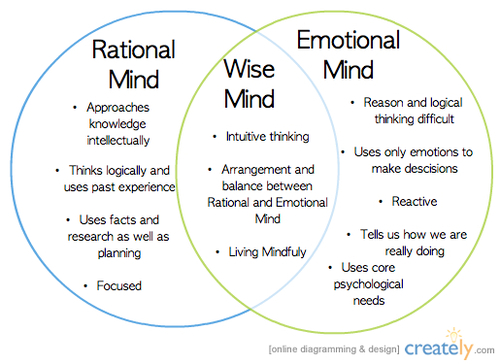One of the tenets of DBT (Dialetical Behavior Therapy) is recognizing Wise Mind. We all have moments in life where we are overly emotional, moody, or reactive. In DBT, this is called Emotion Mind. “When in emotion mind, you are ruled by your moods, feelings, and urges to do or say things. Facts, reason, and logic are not important.” [1]
The opposite of Emotion Mind is Reasonable Mind, a state in which we operate “by facts, reason, logic, and pragmatics. Values and feelings are not important.” [1] In this state, we might approach people in the same way that we might handle an arithmetic problem – systematically.

Both states of mind have useful attributes; however, when an individual spends too much time in either Emotion or Reasonable Mind, they are bound to experience frustrations in their interpersonal dealings and within themselves.
The overlap between Emotion and Reasonable Mind is called Wise Mind. Wise Mind is the perfect balance between reason and emotion. Individuals living in Wise Mind are able to utilize both reason and emotion, taking the middle path to cultivate emotional sensitivity and a calm, cool collectedness. A Wise Mind lives intuitively, taking the time to observe and practice mindfulness. Finding this balance is one of the primary goals of DBT practice.
[1] Quotes from DBT Skills Training, Marsha M. Linehan